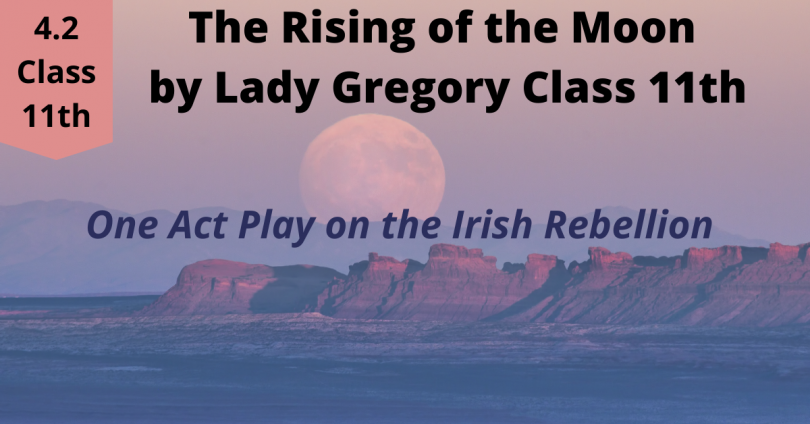Introduction:
The Rising of the Moon by Lady Gregory Lady Gregory (1851-1932) was an Irish dramatist and folklorist who founded the Irish Literary Theatre. A member of a class that identified closely with the working class, she was the co-founder of the Abbey Theatre and the Irish Literary Theatre. Born into a class which identified closely with British rule, Lady Gregory’s sympathies were with the Irish struggle for freedom. She was greatly influenced by Irish mythology and folklore and has written numerous plays and stories. Lady Gregory is best known for her work on The Irish Republic.
Symbolic reference:
“The Rising of the Moon” has a great symbolic meaning. The play is about the Irish freedom movement. The Rising of the Moon is a reference to the rising of the moon of Irish freedom. With her play the dramatist hopes for the liberation of her fellow citizens from the tyranny of the British. We will all change places when the Irish people regain their liberty. The British people will see their downfall. “When the small rise up and the big fall down “…..then we will all change places at “The Rising of the Moon”.
Playwright Lady Gregory’s The Rising of the Moon discusses the relationship between England and Ireland. Here, Ireland is fighting to be freed from the power of the English. The English have dominated over Ireland for quite some time. The central theme of this play is the conflict between duty and patriotism and, through the folklore, myths and songs that they share as a nation, they eventually become united as Irishmen. As a citizen of a country, one’s spiritual sense of duty is seen as more important than one’s feelings of duty towards another nation. Patriotism is the force that brings people together in a country. Lady Gregory’s play, written in Irish English, focuses on two characters. The first is an Irish patriot with a prize on his head who is engaged in the Irish struggle for freedom. The second person is a sergeant who is on the lookout for him, posted at the harbour to check whether the escaped wanted man is seen. Poor and in need of money, the sergeant has no money at all. But a patriot disguised as a ballad singer shows up, singing patriotic songs that inspire the sergeant’s patriotism. The sergeant recognizes the patriot but doesn’t arrest him. A harbour somewhere in Ireland is the place where the British are still the rulers and the Irish patriots are still fighting for their independence. The man lets go and looses the reward. His patriotism overpowers his duty. British authorities put Hundred Pounds as a reward on his head.
Characters:
In this play only four characters are Sergeant, Policeman B, Policeman X and A ragged man.
Sergeant:
The sergeant is playing an important character in the one-act play. This character shows as an Irish citizen but being a sergeant under British Rule, he has to follow the Low and Order that he was on duty to catch the Prisoner who escaped from the prison. But in the end, His patriotism overpowers his duty and he let go of the ragged man who is a patriot of Ireland.

The ragged man (Patriot of Ireland):
The ragged man plays a vital role in The Rising of Moon. It is representing all Irish people and their patriotism. This man was escaped from British rule. British authorities put Hundred Pounds as a reward on his head. So he disguised as a ragged man and pretends as a ballad-singer. Sergeant, Policeman B, and Policeman X were in search of him and Sergeant finds that this ballad singer is nothing but the prisoner who escaped from the prison the man lit up the fire of patriotism within Sergeant’s mind and the Sergeant leaves the ragged man from being arrest. It meant that the man shows here true patriot and does the activities against the British for the freedom of Ireland.
Policeman B and Policeman X:
These two characters are minor but both characters also show that being Irish but by the occupation, they have to follow Low and Order of British authority.
Plot of the play:-
Beginning:
Three police (Sergeant, Policeman B, and Policeman X) enter the quay in a seaport town. They bring lamps and placards about the needed man.
Rising Action:
A man that concedes as an unfortunate Ballad-singer comes to the quay and the sergeant requests that he stay since he has data about the needed man who escaped from the prison.
Peak:
Finally, the sergeant realizes that the man is the one that he is searching for. At the point when his companion came, he is questioned regardless of whether he will deliver the man.
Falling Action:
When Policeman B comes, the sergeant lets the man continues to take cover behind the barrel on the grounds that the man has a similar normal inclination when he is the man’s age.
Goal:
The sergeant laments what he did on the grounds that he lost the prize. but light up the fire of true patriotism within him.
You may also learn about: An Enemy of the People by Henrik Ibsen








Thank you sir 🙏
Thank you sir
Language is easy to understand.
Great explanation, it’s really helpful for me..
Thank you sir…🙏🏻
Thank u sir
You made it very easy for us to understand, sir.
Thank you.
I commend you for your quick thinking as well as for your thorough work..That’s a very good observation…An interesting way of looking at it….Where have you been hiding all this talent?…..Your style has spark. …”We are the lucky one having you as a english teacher”…💯
Really ,you are a skilled teacher…
It will be helpful for every students.your write skill is mind blowing…
Thank you sir for providing amazing website
Thankyou very much sir ,
“Your explanation is very nice… your thinking power is just mind-blowing…as well as, I have to say you are the great English teacher “
The language is easy to understand.
Nice explanation, really it’s very useful for me..,
Thank you Sir…🙏
very nice great explanation & easy language .we can understand nicely .really it’s a helpful for me . thanks a lot sir …
Thank you so much sir….
Thank you so much sir…
Great explanation sir..! Was quite easy to understand the concept explain by you than preferring some reference books. Even it’s helpful in the terms of examinations!
Thank you sir